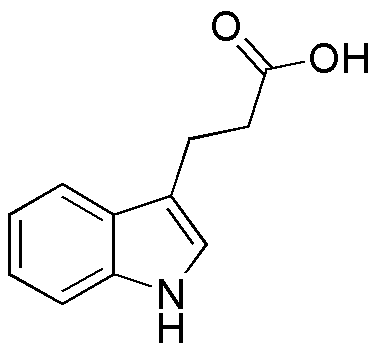Indole-3-propionic acid is widely utilized in research focused on:
- Neuroprotection: This compound has shown potential in protecting neurons from oxidative stress, making it a candidate for developing treatments for neurodegenerative diseases like Alzheimer's and Parkinson's.
- Plant Growth Regulation: Indole-3-propionic acid can enhance plant growth and development, acting as a natural growth regulator. This application is particularly beneficial in agriculture to improve crop yields.
- Antioxidant Properties: Its ability to scavenge free radicals makes it useful in formulating dietary supplements aimed at reducing oxidative damage in the body, appealing to health-conscious consumers.
- Pharmaceutical Development: Researchers are exploring its role in drug formulations, particularly in enhancing the bioavailability of certain medications, which can lead to more effective treatments.
- Food Preservation: Due to its antioxidant properties, it can be used in food products to extend shelf life and maintain quality, offering food manufacturers a natural alternative to synthetic preservatives.
Informations générales
Propriétés
Sécurité et réglementation
Applications
Indole-3-propionic acid is widely utilized in research focused on:
- Neuroprotection: This compound has shown potential in protecting neurons from oxidative stress, making it a candidate for developing treatments for neurodegenerative diseases like Alzheimer's and Parkinson's.
- Plant Growth Regulation: Indole-3-propionic acid can enhance plant growth and development, acting as a natural growth regulator. This application is particularly beneficial in agriculture to improve crop yields.
- Antioxidant Properties: Its ability to scavenge free radicals makes it useful in formulating dietary supplements aimed at reducing oxidative damage in the body, appealing to health-conscious consumers.
- Pharmaceutical Development: Researchers are exploring its role in drug formulations, particularly in enhancing the bioavailability of certain medications, which can lead to more effective treatments.
- Food Preservation: Due to its antioxidant properties, it can be used in food products to extend shelf life and maintain quality, offering food manufacturers a natural alternative to synthetic preservatives.
Documents
Fiches de données de sécurité (FDS)
La FDS fournit des informations de sécurité complètes sur la manipulation, le stockage et l’élimination du produit.
Spécifications du produit (PS)
Le PS fournit une description complète des propriétés du produit, notamment sa composition chimique, son état physique, sa pureté et les exigences de stockage. Il détaille également les plages de qualité acceptables et les applications prévues du produit.
Certificats d'analyse (COA)
Recherchez des certificats d'analyse (COA) en saisissant le numéro de lot du produit. Les numéros de lot et de lot se trouvent sur l'étiquette d'un produit, après les mots « Lot » ou « Lot de fabrication ».
Numéro de catalogue
Numéro de lot/série
Certificats d'origine (COO)
Ce certificat d'exploitation confirme le pays dans lequel le produit a été fabriqué, et détaille également les matériaux et composants utilisés et s'il est issu de sources naturelles, synthétiques ou autres sources spécifiques. Ce certificat peut être requis pour les douanes, le commerce et la conformité réglementaire.
Numéro de catalogue
Numéro de lot/série
Fiches de données de sécurité (FDS)
La FDS fournit des informations de sécurité complètes sur la manipulation, le stockage et l’élimination du produit.
DownloadSpécifications du produit (PS)
Le PS fournit une description complète des propriétés du produit, notamment sa composition chimique, son état physique, sa pureté et les exigences de stockage. Il détaille également les plages de qualité acceptables et les applications prévues du produit.
DownloadCertificats d'analyse (COA)
Recherchez des certificats d'analyse (COA) en saisissant le numéro de lot du produit. Les numéros de lot et de lot se trouvent sur l'étiquette d'un produit, après les mots « Lot » ou « Lot de fabrication ».
Numéro de catalogue
Numéro de lot/série
Certificats d'origine (COO)
Ce certificat d'exploitation confirme le pays dans lequel le produit a été fabriqué, et détaille également les matériaux et composants utilisés et s'il est issu de sources naturelles, synthétiques ou autres sources spécifiques. Ce certificat peut être requis pour les douanes, le commerce et la conformité réglementaire.


